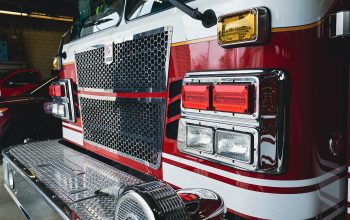Josh Tew’s, Retired Sgt. 1st Class U.S. Army Reserves and Clarion Native, Speech presented at the 2023 CGD Veteran’s Day Program
Good morning,
Thank you for inviting me to speak to you this Veterans Day morning. I feel very honored to be here today.
When Denny Marz invited me to be part of the celebration, I asked him if there was anything specific that he wanted me to speak about. He said, “No, whatever you want to talk about is fine.”
For a moment, I thought I should just read a poem. My mind quickly changed when I realized that at every family holiday or event, from here on out, I would have to listen to my niece, Ella, imitate me reading a poem. So, I decided against that.
As mentioned earlier, I graduated in the year 2000 and enlisted in the United States Army Reserve shortly after that. The following January I was enjoying the nice, sunny Missouri winter for my basic training and Advanced Individual Training for Military Police.
At that time, joining the Army Reserve was believed to be more part-time, where you could gain some experience and get money for college. There had not been much of a demand placed on the Reserves and National Guard since the end of the Gulf War. No one was anticipating anything different.
That all changed after the events of September 11th. The following twenty years would be the busiest in the history of the Army Reserves. With regular deployment rotations, unit training, leadership training, and skill training, the “one weekend a month two weeks a year” pitch seemed laughable. This part-time deal became much more full-time, and it was a struggle to find time to use the college money.
During this time period, there was always a running clock. Always counting down, either to when you could go home, or when you had to leave again. I once woke up at home and realized that it had been six months since we had redeployed, and all that time was moving towards the next deployment.
What makes this cycle bearable is a value that the Army has adopted: Selfless Service. This is putting the needs of others before yourself. Or as the Army tells us to define it: “Put the welfare of the nation, the Army, and your subordinates before your own.”
When someone is called to serve, this is what they do. Their plans change, their life and the lives of their family are altered, and sometimes permanently. There is no guarantee that you will be able to attend holidays, birthdays, sporting events, weddings, or funerals. Selfless service is at the heart of how military units function. There are plenty of opinions on what our government does or does not do, but at the Soldier, Sailor, Marine, or Airman level, you complete your mission for the people you are with. Selfless service develops bonds between service members that last for generations. When a team serves together, they will reach the point where they operate as one.
In his memoir, To Hell and Back, Audie Murphy demonstrates this value. In particular, a battle; he climbed onto a burning tank to use the machine gun to repel the advancing German forces. As he explains this event, you get the sense he was much more concerned about saving the members of his unit. He even tells the story in such a way as to suggest that anyone else in the unit would have done the same thing. In fact, most of the book was written like that. He never once mentions that he was the most decorated American Soldier in history, receiving the Congressional Medal of Honor for his actions with the burning tank.
Reflecting on my military service, the most important lesson that I had to learn was that service is not about you; it is about your people. I find myself thinking more about the times when I did not live up to this value than all my accomplishments. Your fellow service members will likely forget your accomplishments, but they will remember how you sacrificed for them and how you treated them.
I sought to demonstrate what selfless service looked like to my Soldiers. In all missions and tasks, I tried to provide a sense of service that would be extended to the units that we worked with. Demonstrating that we were there to help them accomplish their mission.
There are some in here who are discerning military life, and I would encourage anyone to explore a commitment to service. My advice to someone who is interested in pursuing military service is this: a life of service does not end once you exit the military; you will still have a desire to serve and be a part of something. A longing for another mission will always be there.
I want to close today with an expression of gratitude for those who have supported the men and women in the military. I know that many of you have family members and friends who have served, and your sacrifice and dedication are significant.
I can tell you without a doubt that any time you send a card or a care package to a deployed service member, you give them a little sense of normalcy in an unfamiliar place.
Thank you for your time and to all the Veterans and their families, thank you for what you have done and have continued to do for our country.

